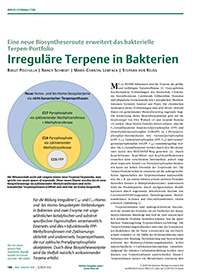Irregular terpenes: A new biosynthetic pathway expands the terpene portfolio in bacteria
DOI:
https://doi.org/10.11576/biuz-7120Keywords:
Serratia, Pseudomonas, Variovorax, Methyltransferase, Terpensynthase, Sodorifen, Chlororaphen, bifunktionale Enzyme, Multiproduktenzyme, ZyklisierungAbstract
The biosyntheses of sodorifen and chlororaphen demonstrate impressively that in bacteria an additional way of terpene biosynthesis was established which results in the production of new – so far unknown – natural terpene products. For these biosynthetic pathways, especially the properties of two specialized enzymes are responsible. This is on the one hand a bifunctional SAM-dependent FPP-methyltransferase with cyclase activity and on the other hand a terpene synthase with altered substrate specificity. Thus, it has been documented that – deviating from the C5 unit-depending isoprene rule – there is another possibility of modifying classical prenyl pyrophosphates to C16 or C17 cyclized substrates. Subsequently, the 136-year-old isoprene dogma has to be expanded or modified.


